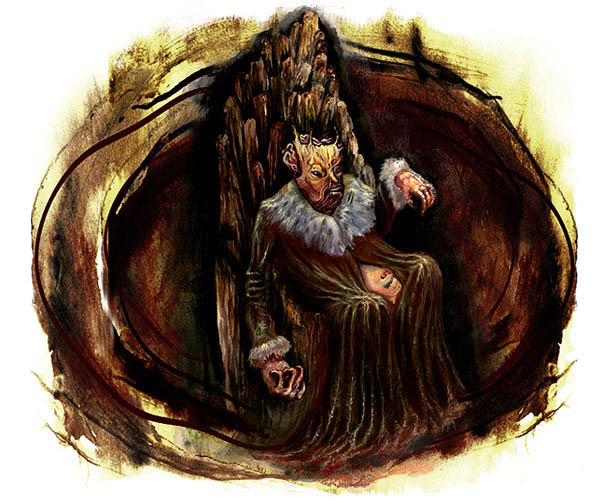|
Circle 4 (Avarice & Prodigality) Encounter Plutus Allusion Fortuna Gallery Audio Study Questions Home |

|
|
Avarice and Prodigality Plutus, a wolflike beast, shouts a warning to Satan as Dante and Virgil enter the fourth circle of Hell, but Virgil's harsh rebuke silences him and allows the travelers to pass unscathed. Dante now sees a multitude of shades damned for the sin of avarice (holding wealth too tightly) or its opposite, prodigality (spending too freely). The two groups push heavy boulders with their chests around a circle in opposite directions: when the avaricious and the prodigal collide, they turn and, after casting insults at one another, repeat the journey in the other direction. So filthy have the souls become as a result of their sordid lives that Dante cannot recognize them individually, though Virgil reports the presence of many clerics, including cardinals and popes, among the avaricious. He also explains to Dante the divine role of Fortuna in human affairs. Avarice--greed, lust for material gain--is one of the iniquities that most incurs Dante's scornful wrath. Consistent with the biblical saying that avarice is "the root of all evils" (1 Timothy 6:10), medieval Christian thought viewed the sin as most offensive to the spirit of love; Dante goes even further in blaming avarice for ethical and political corruption in his society. Ciacco identifies avarice--along with pride and envy--as one of the primary vices enflaming Florentine hearts (Inf. 6.74-5), and the poet consistently condemns greed and its effects throughout the Divine Comedy. Dante accordingly shows no mercy--unlike his attitude toward Francesca (lust) and Ciacco (gluttony)--in his selection of avarice as the capital sin punished in the fourth circle of hell (Inferno 7). He viciously presents the sin as a common vice of monks and church leaders (including cardinals and popes), and he further degrades the sinners by making them so physically squalid that they are unrecognizable to the travelers (Inf. 7.49-54). By defining the sin as "spending without measure" (7.42), Dante for the first time applies the classical principle of moderation (or the "golden mean") to criticize excessive desire for a neutral object in both one direction ("closed fists": avarice) and the other (spending too freely: prodigality). Fittingly, these two groups punish and insult one another in the afterlife. back to top Plutus Dante's Plutus, guardian-symbol of the fourth circle (avarice and prodigality), is--like other infernal creatures--a unique hybrid of sources and natures. Often portrayed as the mythological god of the classical underworld (Hades), Plutus also appears in some cases as the god of wealth. Dante neatly merges these two figures by making Plutus the "great enemy" (Inf. 6.115) in hell with a special relationship to the sin most closely associated with material wealth. Dante similarly combines human and bestial natures in his conception of Plutus (Inf. 7.1-15): he possesses the power of speech (though the precise meaning of his words--some sort of invocation to Satan--is unclear) and the ability to understand--or at least react to--Virgil's dismissive words, while at the same time displaying a distinctly bestial rage and probably animal-like features as well. back to top Fortuna Consistent with his devastating indictment of sinful attitudes toward material wealth, Dante has a very strong and original idea of the role of fortune in human affairs (Inf. 7.61-96). Fortune is certainly a powerful force in earlier philosophy and literature, most notably in Boethius' Consolation of Philosophy. Dante claims to have read this Latin work, which was highly influential throughout the Middle Ages, in the difficult period following the death of his beloved Beatrice. Fortune, for Boethius, is represented as a fickle and mischievous goddess who delights in her ability to change an individual's circumstances--for better or ill--on a whim. It is far more constructive, according to Boethius (who has been unjustly deprived of his possessions, honors, and freedom), to ignore one's earthly status altogether and trust only in what is certain and immutable. Adverse fortune is ultimately better than good fortune because it is more effective in teaching this lesson. Dante's Fortuna is also female but he imagines her as a "divine minister" (an angelic intelligence) who guides the distribution of worldly goods, just as God's light and goodness are distributed throughout the created universe. She is above the fray, immune to both praise and blame from those who experience the ups and downs of her actions. Much as Dante "demonizes" mythological creatures from the classical underworld, so he "deifies" in a positive sense the traditional representation of fortune. The ways of fortune, like the application of divine justice generally, are simply beyond the capacity of human understanding. back to top Audio "volve sua spera e beata si gode" (7.96) [Fortuna] turns her sphere and, blessed, she rejoices back to top Study Questions 1. Try to draw for yourself the punishment described in 7.22-35. 2. How is this punishment appropriate for the vices of this circle? Consider the relevance of Virgil's description of fortune in 7.70-96. back to top Back to Inferno main page | |
|